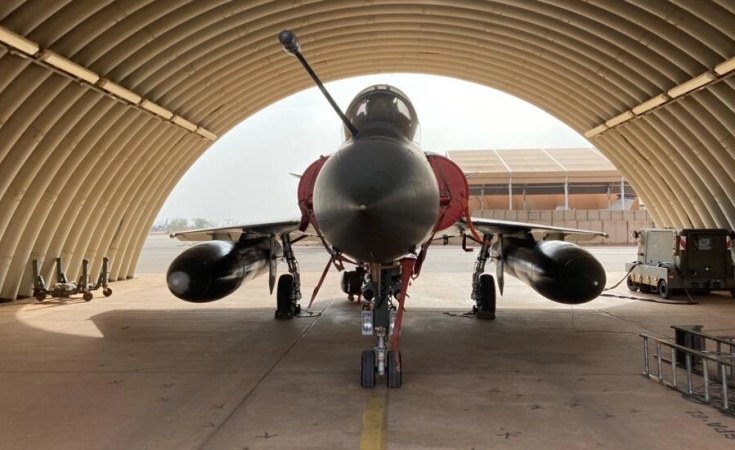Paris — France closes 2023 with a diminished presence in Africa's restive Sahel region, after withdrawing troops from three once-staunch allied countries collectively fighting an Islamist insurgency, and seeing its influence increasingly replaced by other powers, including Russia.
The last French soldiers left Niger earlier this month, with Paris taking the unusual step of closing its embassy in Niamey as well. The troop withdrawal follows a pullout from Burkina Faso earlier this year and from Mali in 2022 -- following coups in all three countries condemned by France, the former colonial power -- and amid rising anti-French sentiment.
A five-country alliance, the G-5 Sahel, that partnered with France to fight terrorism across a swathe of desolate territory south of the Sahara, has all but collapsed. The remaining members, Chad and Mauritania, suggest its dissolution is near.
And on Sunday, Nigerien authorities announced they were suspending all cooperation with the Paris-based International Organization of Francophone Nations, aimed to promote the French language.
Now, as other countries and entities soften stances toward coup leaders they once condemned, Paris appears increasingly isolated in bucking the trend -- a stance some observers believe must change.
"It's time that France shows certain pragmatism," the influential Le Monde newspaper wrote in a September editorial, as Paris remained locked in a standoff with coup leaders in Niger. "Although the reality of our institutional ties with the African continent is multiform, it's not healthy that French influence appears almost completely within a military dimension."
Bakery Sambe, director of the Dakar-based Timbuktu Institute-African Center for Peace, offered a similar take.
"France's retreat from Niger signals a new era," he said. "It underscores a broader trend of needing to rethink security cooperation -- and of cooperation overall."
Filling the void
France's reduced influence in the Sahel contrasts sharply with a decade ago, when Paris launched its Barkhane counterinsurgency operation, aimed at working alongside the five most affected countries in pushing back jihadist threats. At its height, some 5,500 French troops were stationed in the region.
The cascade of coups, first in Mali, then in Burkina Faso last year and finally in Niger in July -- all three countries at the heart of the Sahel insurgency -- has sharply shrunk those numbers. Just 1,000 French troops now remain in Chad, where France currently bases its anti-jihadist operation in the region.
When coup generals toppled Nigerien President Mohamed Bazoum in July, France remained staunchly behind the democratically elected leader. It initially refused the generals' request to repatriate French Ambassador Sylvain Itte or to withdraw French forces.
While other nations and institutions adopted a similar tough approach, their positions have since softened. The Economic Community of West African States, or ECOWAS, which once threatened a military intervention, has shelved its insistence that Bazoum be reinstated. It now calls for a short power transition and other conditions in return for lifting sanctions.
The United States, which dispatched a new ambassador to Niger in August, said this month it was willing to resume cooperation with Niger, if Niamey promised to swiftly restore civilian rule. In sharp contrast to its position on France, Niger's new government has not called for the departure of the roughly 1,000 U.S. troops stationed on its territory.
German Defense Minister Boris Pistorius, who visited Niger earlier in the month, said Berlin was interested in resuming projects with the ruling military. Germany has a small military contingency in Niger.
"Germany is trying to fill a void left by France in the Sahel," said analyst Sambe, summing up a broader European concern. "There needs to be a champion in the region."
A new generation of Africans also views the U.S. favorably, Sambe said; it does not have the baggage carried by France as a former colonial power, and, it has adopted a low-key presence in the region.
"Africans want to diversify their partnerships with other countries," he said. "There's a new generation without the complexes of previous ones that demands respect."
A broader Sahel vision
A succession of French leaders has promised to reboot French ties to Africa. That includes President Emmanuel Macron, who earlier this year also promised a sharply reduced and revamped military presence on the continent, even as he seeks new ties beyond France's former colonial empire.
But a November report by France's National Assembly calls for bigger changes: from creating more Africa specialists within the foreign ministry and appointing ambassadors with roots in the African diaspora, to rehauling French development aid and adopting a more transparent and pragmatic Africa policy.
"The deterioration of our ties to Africa is such that our relationship with the continent must be prioritized in order to renew it," the report's co-author, Bernard Fuchs, told Le Monde.
Meanwhile, the military governments in Mali and Burkina Faso have moved away from France and the West to strengthen ties with Russia and its Wagner paramilitary group. Early in December, Niger annulled two security deals with the European Union and held talks with Russian officials to strengthen security cooperation.
Despite Russia's growing influence, insecurity in the Sahel has grown, analysts and officials say. Russia has also been accused of rights violations.
For his part, the Timbuktu Institute's Sambe said he does not believe the Sahel's new generation is necessarily moving toward Russia but rather away from France.
To offer an attractive alternative, he believes Paris and other Western governments need to consider policies that emphasize development along with security and consider coastal West African nations that are increasingly at risk of jihadist attacks.
"There has to be a vision of a broader Sahel," he said, "that addresses the region's weaknesses and especially fights against disinformation."


